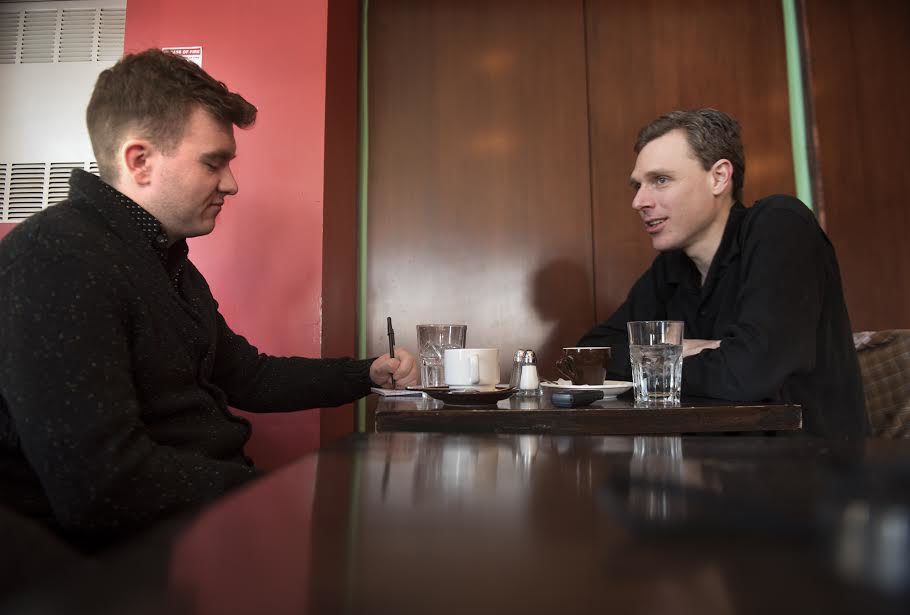Josh O’Kane on trading breaking business news for book writing
By Matthew Burley
Josh O’Kane is a small business writer for the Globe and Mail. In his five years with the Globe, O’Kane has been writing about business, growth strategies, commercial property and music.
His new book, Nowhere With You: The East Coast Anthems of Joel Plaskett, The Emergency and Thrush Hermit is about Plaskett’s experiences while sticking to his roots in Halifax and expanding as a Canadian musician.
O’Kane spoke with J-Source about the challenge of transitioning from writing news articles to a non-fiction book. This interview has been edited and condensed for clarity.
J-Source: For one of your presentations at NASH, the annual Canadian University Press conference, you joined Chris Jones and Carly Lewis on stage and spoke about your experiences in writing your forthcoming book, Nowhere With You, about Joel Plaskett. What made you pursue non-fiction instead of a novel or script?
Josh O’Kane: I’d say it’s just an extension of what I do on a day-to-day basis. I’ve been writing for a little more than a decade and I wanted a new challenge, so why not try multiplying that times 100? And to see if I could write about one thing with an absolutely insane amount of depth. I’m also a huge music nerd, so it gave me the opportunity to spend an insane amount of time studying something that I really love.
J-Source: What made you want to write about Joel Plaskett?
JO: Joel’s music was sort of the soundtrack of me leaving the East Coast, and I really became interested in his music around that time. I saw these themes emerge about leaving and loss, and sometimes they’re very direct, and sometimes they’re very subtle that flow throughout all of his input, at least since the year 2000.
I thought, this guy’s a full-blown artist who sells out venues across the country. It’d be really interesting to write about his art in the context of people leaving the Maritimes and the bands that he saw go away while he stuck it out there and created a career. There’s so many angles, so I thought that if I was going to be putting two years of my life into something, it might as well be on something that I was already interested in significantly.
J-Source: How was writing a book different than your work as a journalist? Was it a major change or a minor transition?
JO: Oh, it was a major change. I’ve been writing for the Globe for nearly five years now, three when I started to write the book, and I’m very attuned to writing in the very specific and authoritative voice that the Globe and Mail has. But I was interested in if I were to write much longer for a different publication, would I find my own voice? And I think I did.
There’s a little bit more humor that comes across in the book, and I was able to play with a little bit more a narrative form than I could have with 500 to 1,000 words. I could actually express themes and allow them to appear with subtext throughout the narrative and then hit them on the head later in the book. And to actually build a narrative with a variety of characters, with drama and with tension.
The opening scene is probably 2,000 words of why he’s driving to Cape Breton, New Year’s Eve, 1999. I don’t have 2,000 words to write a scene at a newspaper, so it’s fun to experiment with that form in my off hours.
J-Source: During your unpaid leave while writing Nowhere With You, did you find it difficult to stay relevant in the journalism community?
JO: I felt like I was missing out on a lot; I read about Spotify and I had just gotten out of a long interview with Joel’s drummer and I remember being, “Oh, I had wanted to write about that,” because that’s what I like to cover—and I couldn’t because I was away. I missed the thrill of chasing breaking news. If anything, it feels weird to not chase the stories that you want to, but that’s one of the sacrifices you have to make.
Matthew Burley is a third-year journalism student who studies at Wilfrid Laurier University’s Brantford campus. Matthew is currently on the Board of Directors for WULSP, the Arts & Culture editor for The Sputnik and has also been featured in the Uxbridge Town Talk.
Correction: A previous version of this story stated that O’Kane writes about community property. He writes about commercial property. We apologize for the error.

